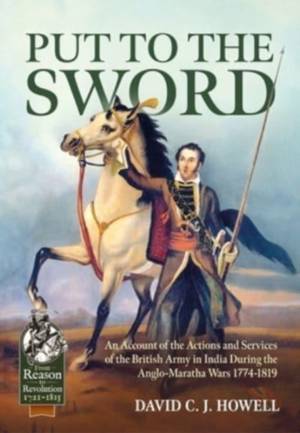
- Afhalen na 1 uur in een winkel met voorraad
- Gratis thuislevering in België vanaf € 30
- Ruim aanbod met 7 miljoen producten
- Afhalen na 1 uur in een winkel met voorraad
- Gratis thuislevering in België vanaf € 30
- Ruim aanbod met 7 miljoen producten
Zoeken
Put to the Sword
An Account of the Actions and Services of the British Army in India During the Anglo-Maratha Wars 1774-1819
David C J Howell
€ 41,95
+ 83 punten
Omschrijving
In 1774 the British East India Company engineered a war against one of India's most challenging peoples, the Marathas, in order to strengthen the security of its existing dominions and to expand territory and influence. It was a mistake which caused the surrender, retreat and humiliation of a British army and left the Marathas in an improved position militarily. British forces during the First Anglo-Maratha War of 1774-1783, suffered at the hands of a much wilier Maratha foe than they had ever anticipated.
The Second Anglo-Maratha war was fought in two spheres of India, the Deccan and Hindustan, in order that the Company could replace the power vacuum left from the previous war 20 years before. During the second war the focus to a large extent has been on the successful battles and career of Arthur Wellesley during seven years in India, his victory at Assaye in, but disaster followed for other British armies in Hindustan with a calamitous retreat to Agra and a disastrous siege at Bhurtpore.
In 1817, for the third and final war against the Marathas, the British put their largest army yet into the field in a concerted effort to finally settle the issue of Maratha intransigence and opposition, together with the eradication of the criminal subculture of the Pindaris, hordes of bandit horsemen who wreaked havoc on British and the indigenous people of northwest India, and their Maratha sponsors. This was a relatively brief war but a single incident closed a general's career and brought severe condemnation from parliament and later historians.
The Second Anglo-Maratha war was fought in two spheres of India, the Deccan and Hindustan, in order that the Company could replace the power vacuum left from the previous war 20 years before. During the second war the focus to a large extent has been on the successful battles and career of Arthur Wellesley during seven years in India, his victory at Assaye in, but disaster followed for other British armies in Hindustan with a calamitous retreat to Agra and a disastrous siege at Bhurtpore.
In 1817, for the third and final war against the Marathas, the British put their largest army yet into the field in a concerted effort to finally settle the issue of Maratha intransigence and opposition, together with the eradication of the criminal subculture of the Pindaris, hordes of bandit horsemen who wreaked havoc on British and the indigenous people of northwest India, and their Maratha sponsors. This was a relatively brief war but a single incident closed a general's career and brought severe condemnation from parliament and later historians.
Specificaties
Betrokkenen
- Auteur(s):
- Uitgeverij:
Inhoud
- Aantal bladzijden:
- 424
- Taal:
- Engels
- Reeks:
Eigenschappen
- Productcode (EAN):
- 9781915070456
- Verschijningsdatum:
- 15/05/2022
- Uitvoering:
- Paperback
- Formaat:
- Trade paperback (VS)
- Afmetingen:
- 171 mm x 248 mm

Alleen bij Standaard Boekhandel
+ 83 punten op je klantenkaart van Standaard Boekhandel
Beoordelingen
We publiceren alleen reviews die voldoen aan de voorwaarden voor reviews. Bekijk onze voorwaarden voor reviews.











